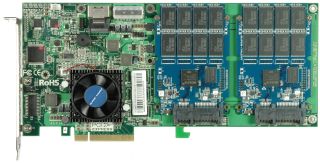Super Talent's 512GB RAIDDrive: RAID On An Add-In Card
Conclusion

The RAIDDrive, by Super Talent, is available in 26 different models, using either MLC or SLC flash SSDs, RAID 0 or RAID 5 drive arrays, and with or without a battery backup unit. All RAIDDrives consist of powerful RAID controllers based on Intel’s IOP348, and utilize PCI Express x8 with a few solid state drives directly mounted on the PCB.
Overall results are impressive. Our sample reached sustained, sequential read performance of 721 to 892 MB/s. The 721 MB/s minimum, in particular, is much more than any Fusion-io product can provide, and none of Fusion-io’s products are currently available at 1TB or higher. Meanwhile, Super Talent hits these high capacities. Write performance is similarly impressive at around 500 MB/s, but some of Fusion-io’s ioDrives can be quicker here. More importantly, though, the RAIDDrive is bootable, while Fusion-io products currently are not. Driver support is available for virtually all relevant operating systems.
However, the RAIDDrive doesn’t shine in all of our benchmarks. We received disappointing scores in PCMark Vantage (fortunately, not the target market for this product), which simulates several real-world applications. In this benchmark, the Super Talent drive—or at least our test sample—isn’t much faster than an individual SSD. The models utilizing SLC flash are probably faster. This leads us to believe the RAID-based architecture isn’t favorable for consumer PCs, at least in this benchmark.
We got better news from the I/O performance tests. The I/O rates of our MLC-powered RAIDDrive are significant, to say the least. The RAIDDrive constantly beats the ioXtreme, as long as the latter is configured to offer its maximum capacity. If the ioXtreme is set to improved or maximum write performance, it will deliver higher maximum I/Os, but it will fall to levels below the RAIDDrive in scenarios with varying workloads.
The final conclusion depends on pricing up and down the lineup, which is probably too expensive for enthusiast PCs (we know that the 1TB RAIDDrive GS, for gamers and enthusiasts, will be priced at $4,999). RAID controllers cost a few hundred dollars; 128MB SSDs with Indilinx controllers cost another $250 each. We’ve probably gotten close to the price you should expect for a 512GB RAIDDrive: in excess of $1,000.
Fusion-io’s ioDrive is much faster on I/Os, but it has a hard time competing in throughput, plus it isn't bootable. In the end, should the RAIDDrive make it to market as a real product (it isn't available for sale publicly yet), it could be available at a much more attractive cost per gigabyte than most other enterprise RAID solutions. The 1- to 2-year warranty isn’t a real confidence-booster, but this detail can be easily adjusted by Super Talent, should the company see fit to sync up a bit better with its MTBF rating. The concept is solid.
Stay on the Cutting Edge
Join the experts who read Tom's Hardware for the inside track on enthusiast PC tech news — and have for over 25 years. We'll send breaking news and in-depth reviews of CPUs, GPUs, AI, maker hardware and more straight to your inbox.
Most Popular

